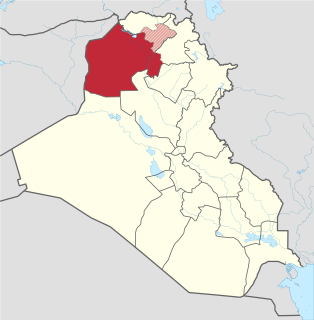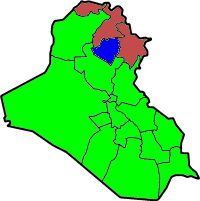The politics of Iraq take place in a framework of a federal parliamentary representative democratic republic. It is a multi-party system whereby the executive power is exercised by the Prime Minister of the Council of Ministers as the head of government, as well as the President of Iraq, and legislative power is vested in the Council of Representatives and the Federation Council.

Kirkuk Governorate or Kirkuk Province is a governorate in northern Iraq. The governorate has an area of 9,679 square kilometres (3,737 sq mi). In 2017 the estimated population was 1,259,561 people. The provincial capital is the city of Kirkuk. It is divided into four districts.

Nineveh Governorate is a governorate in northern Iraq that contains the ancient Assyrian city of Nineveh. It was an integral part of Assyria from the 25th century BC to the 7th century AD. It has an area of 37,323 km2 (14,410 sq mi) and an estimated population of 2,453,000 people in 2003. Its chief city and provincial capital is Mosul, which lies across the Tigris river from the ruins of ancient Nineveh. Tal Afar is the second-biggest city. Before 1976, it was called Mosul Province and included the present-day Dohuk Governorate, which is now part of the autonomous Iraqi Kurdistan.

Erbil Governorate, sometimes referred to by the alternative spelling Arbil Governorate, is a governorate in Iraqi Kurdistan.

Al Anbar Governorate, or Anbar Province, is the largest governorate in Iraq by area. Encompassing much of the country's western territory, it shares borders with Syria, Jordan, and Saudi Arabia. The provincial capital is Ramadi; other important cities include Fallujah and Haditha.

The Iraqi Islamic Party is the largest Sunni Islamist political party in Iraq as well as the most prominent member of the Iraqi Accord Front political coalition. It was part of the government of Prime Minister Nouri al-Maliki and is part of the current government of Haider al-Abadi since 2014. Osama Tawfiq al-Tikriti succeeded Vice-President Tariq al-Hashimi as the party's secretary-general on 24 May 2009, who was succeeded in July 2011 by Ayad al-Samarrai.

Elections for the National Assembly of Iraq were held on January 30, 2005 in Iraq. The 275-member National Assembly was a parliament created under the Transitional Law during the Occupation of Iraq. The newly elected transitional Assembly was given a mandate to write the new and permanent Constitution of Iraq and exercised legislative functions until the new Constitution came into effect, and resulted in the formation of the Iraqi Transitional Government.

The Council of Representatives is the unicameral legislature of the Republic of Iraq. It is currently composed of 329 seats and meets in Baghdad inside the Green Zone.

The Iraqi Turkmen Front is a political movement founded in 1995 which seeks to represent the Iraqi Turkmen people. Since the fall of Saddam Hussein in 2003, the ITF has contested control of Kirkuk and other areas of northern Iraq. The ITF claims that Kirkuk belongs to the Turkmen people although they compose only 13–17 percent of the population.

The electorate of Iraq went to the polls on 15 October 2005 to vote in a referendum on whether or not to ratify the proposed constitution of Iraq. After 10 days of counting votes, the country's electoral commission announced that the constitution had been approved by a wide margin nationwide. A number of critics allege massive irregularities, especially in the crucial province of Ninawa, which was widely expected to provide the third "no" vote.
The federal government of Iraq is defined under the current Constitution, approved in 2005, as an Islamic, democratic, federal parliamentary republic. The federal government is composed of the executive, legislative, and judicial branches, as well as numerous independent commissions.

The State of Law Coalition also known as Rule of Law Coalition is an Iraqi political coalition formed for the Iraqi governorate elections, 2009 by the Prime Minister of Iraq at the time, Nouri al-Maliki, of the Islamic Dawa Party.

The Iraqi Kurdistan Governorate Council elections of 2005 were held on the 31 January 2005, to coincide with the Iraqi legislative elections of January 2005 and the Iraqi Kurdistan legislative elections of January 2005. The elections were held to choose 41 council members for each of the three governorates of Iraqi Kurdistan, that is Dahuk, Erbil and Sulaymaniyah governorates. During the election, the Patriotic Union of Kurdistan (PUK) won a plurality of the votes, however, the Kurdistan Democratic Party (KDP) won a plurality of the council seats.

Governorate or provincial elections are due to be held in Dahuk Governorate in 2009 to replace the governorate council elected in the Iraqi governorate elections of 2005. The remaining governorates outside Iraqi Kurdistan held elections on 31 January 2009. The election will follow the Iraqi Kurdistan legislative election, 2009.
List of the Martyr al-Mehraab and the Independent Forces,, commonly known as the al-Mehraab Martyr List was a Shi'a Islamist, Iraqi political coalition formed for the Iraqi governorate elections, 2009 by the Islamic Supreme Council of Iraq.

Governorate or provincial elections were held in Iraq on 20 April 2013, to replace the local councils in the governorates of Iraq that were elected in the Iraqi governorate elections of 2009. Elections took place in 12 of Iraq's 18 governorates. Elections didn't take place in the 3 governorates forming the Kurdistan Region or Kirkuk, Anbar, or Ninevah, meaning that a total of 378 provincial council seats were up for election.
The Muthanna governorate election of 2013 was held on 20 April 2013 alongside elections for all other governorates outside Iraqi Kurdistan, Kirkuk, Anbar, and Ninevah.

The 2013 Nineveh Governorate election in Iraq was held on 20 June with elections for the Al Anbar Governorate. Due to security problems, turnout was less than half that of the 2009 election. This election saw Sunni Arab parties lose a number of seats to minority parties.

Parliamentary elections were held in Iraq on 30 April 2014. The elections decided the 328 members of the Council of Representatives who will in turn elect the Iraqi President and Prime Minister.

The Uniters for Reform Coalition is a Sunni political coalition in Iraq.


















